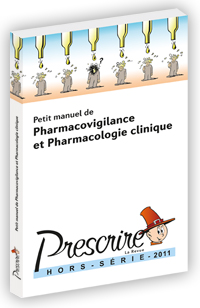France's Mediator° (benfluorex) scandal demonstrated a gaping lack of knowledge about pharmacovigilance and clinical pharmacology. This lack has caused, and will continue to cause, victims by the thousands. Reinforced initial training and continuing education in these areas are required, to prevent future disasters and to promote safer and more effective care for each patient.
 Prescrire therefore decided to create this handbook without delay, and to make it available free of charge online at www.prescrire.org. Printed copies of the handbook (in French) are available at cost price (7 euros).
Prescrire therefore decided to create this handbook without delay, and to make it available free of charge online at www.prescrire.org. Printed copies of the handbook (in French) are available at cost price (7 euros).
This 79-page selection of articles in French, most previously published in Prescrire, is designed to create useful signposts and to lay out certain basic principles and key concepts of pharmacovigilance. The selection is designed above all for use by future healthcare professionals: pharmacists, physicians, nurses, midwives, dentists, etc. It is also useful for continuing medical education, especially to redirect practices towards a greater level of patient safety.
This non-exhaustive selection of texts will help the reader to know and understand drugs' effects, in order to predict their consequences and to protect patients from adverse effects.
The handbook has 4 sections:
- Knowing adverse effect profiles and drug mechanisms in order to anticipate the dangers;
- Balancing harms and benefits and evaluating risks;
- Epidemiology and history hold many lessons;
- Using this information and putting it into perspective.
Beginning in the late 1990s, Prescrire was already warning about the risks of Mediator°, on the basis of pharmacology. And now, in late 2011, Prescrire is publishing a reference work on pharmacovigilance.
> Petit manuel de Pharmacovigilance et Pharmacologie clinique (in French, Free)
©Prescrire 20 December 2011
